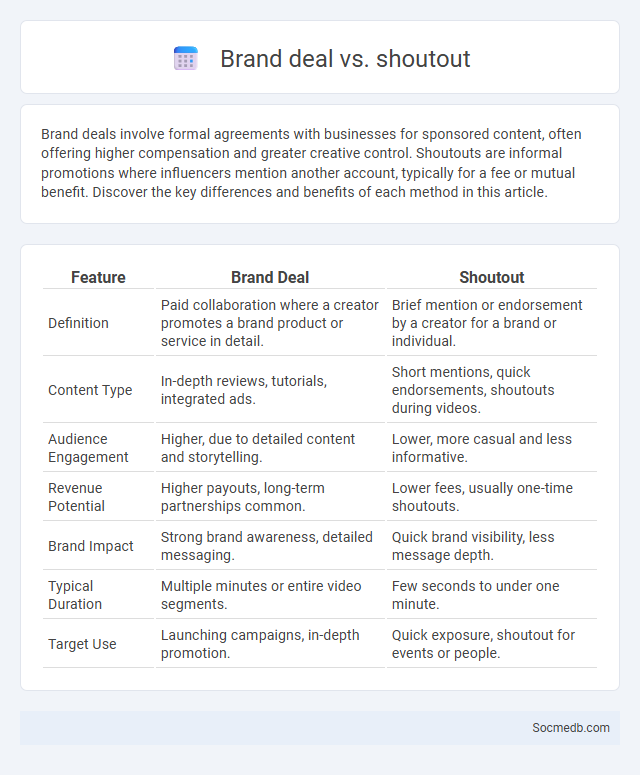
Photo illustration: Brand deal vs Shoutout
Brand deals involve formal agreements with businesses for sponsored content, often offering higher compensation and greater creative control. Shoutouts are informal promotions where influencers mention another account, typically for a fee or mutual benefit. Discover the key differences and benefits of each method in this article.
Table of Comparison
| Feature | Brand Deal | Shoutout |
|---|---|---|
| Definition | Paid collaboration where a creator promotes a brand product or service in detail. | Brief mention or endorsement by a creator for a brand or individual. |
| Content Type | In-depth reviews, tutorials, integrated ads. | Short mentions, quick endorsements, shoutouts during videos. |
| Audience Engagement | Higher, due to detailed content and storytelling. | Lower, more casual and less informative. |
| Revenue Potential | Higher payouts, long-term partnerships common. | Lower fees, usually one-time shoutouts. |
| Brand Impact | Strong brand awareness, detailed messaging. | Quick brand visibility, less message depth. |
| Typical Duration | Multiple minutes or entire video segments. | Few seconds to under one minute. |
| Target Use | Launching campaigns, in-depth promotion. | Quick exposure, shoutout for events or people. |
Understanding Brand Deals
Understanding brand deals on social media involves recognizing their impact on your online presence and revenue streams. These partnerships connect influencers and brands, leveraging audience trust to promote products or services effectively. Mastering negotiation terms, disclosure requirements, and content alignment ensures successful and compliant collaborations.
What Is a Shoutout?
A shoutout on social media is a public acknowledgment or mention of another user, brand, or content creator, often used to promote their profile or work. It typically involves tagging the person or entity in a post, story, or video, increasing their visibility to a broader audience. Influencers and businesses leverage shoutouts to boost engagement, followers, and collaborative reach, making them a valuable marketing tool in digital strategies.
Brand Deals vs Shoutouts: Key Differences
Brand deals involve formal collaborations between influencers and companies, featuring negotiated contracts, specific deliverables, and often higher compensation compared to shoutouts. Shoutouts are typically brief, informal mentions or endorsements by influencers to promote a brand or product, usually for a smaller fee or reciprocal promotion. Understanding the distinct objectives and scope of brand deals versus shoutouts is crucial for maximizing marketing impact and influencer ROI on social media platforms like Instagram and TikTok.
How Brand Deals Work
Brand deals on social media involve collaborations where influencers promote products or services in exchange for compensation. These partnerships rely on your audience reach and engagement metrics to determine deal value and scope. Clear agreements outline content requirements, deliverables, and payment, ensuring transparency and mutual benefit.
The Mechanics of Shoutouts
Shoutouts on social media involve one user promoting another's profile or content to their followers, boosting visibility and engagement. This mutual endorsement leverages network effects to increase follower count, brand awareness, and credibility. Your strategic use of shoutouts can accelerate community growth and enhance your online presence efficiently.
Benefits of Brand Deals for Creators
Brand deals offer creators significant financial opportunities, enabling them to monetize their content and scale their personal brands effectively. Collaborating with reputable companies enhances creators' credibility and expands their audience reach through targeted promotional campaigns. These partnerships also allow creators to access new resources, tools, and exclusive products, fostering creativity and professional growth in the competitive digital landscape.
Advantages and Limitations of Shoutouts
Shoutouts on social media provide a powerful tool to increase brand visibility and grow audience engagement by leveraging the follower base of influencers or complementary accounts. They facilitate authentic peer recommendations, which can drive higher trust and conversion rates compared to traditional advertising. However, limitations include potential high costs, risk of low ROI if the shoutout is not targeted properly, and dependency on the influencer's credibility and audience relevance.
When to Choose a Brand Deal
Selecting the right moment for a brand deal requires analyzing audience engagement metrics and aligning with product launch timelines to maximize impact. High social media interaction rates during peak user activity hours increase the effectiveness of sponsored content. Brands benefit from timing partnerships around relevant industry events or trending topics to enhance visibility and authenticity.
When Shoutouts Make Sense
Shoutouts on social media are most effective when targeting niche audiences that align with brand values or campaign goals. Leveraging influencers or micro-influencers with genuine engagement boosts credibility and extends reach organically. Timing shoutouts during product launches, events, or trending moments enhances visibility and drives meaningful interactions.
Deciding Between Brand Deals and Shoutouts
Deciding between brand deals and shoutouts on social media involves understanding your audience engagement and content style. Brand deals typically offer higher revenue and longer-term partnerships, while shoutouts provide quicker exposure and follower growth. Evaluating your goals and your audience's preferences helps you maximize the impact of your social media strategy.
 socmedb.com
socmedb.com